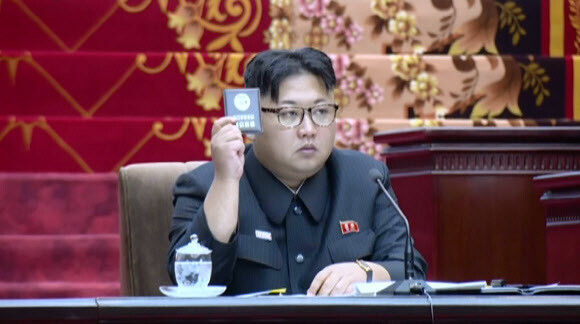hankyoreh
Links to other country sites 다른 나라 사이트 링크
Kim Jong-un consolidates his grip on party, government and army

On June 29, North Korea held a meeting of the Supreme People’s Assembly about 50 days after the congress of the Korean Workers’ Party (KWP).
As predicted, the Supreme People’s Assembly selected North Korea’s leader Kim Jong-un to chair the Commission on State Affairs, the highest position in the government. Kim was appointed KWP chairman, the highest party rank, during the KWP congress last month.
Since Kim is also the supreme commander of the Korean People’s Army, as North Korea‘s military is known, he has now risen to the highest possible positions in all three areas of power in North Korea: the party, the government and the army. This effectively institutionalizes Kim Jong-un’s autocratic rule.
Now that Kim has become the chairman of the Commission on State Affairs, this is expected to form the basis for a series of appointments to important state positions, including the members of the cabinet.
Leading up this meeting of the Supreme People’s Assembly, many predicted that North Korea would follow up on the party congress by taking a number of measures, including changing Kim Jong-un’s government responsibilities, appointing cabinet members and announcing the specifics of North Korea’s five-year economic development strategy.
“During this meeting of the Supreme People’s Assembly, North Korea is likely to seek to cement the power structure and consolidate Kim Jong-un‘s one-man rule. There is also likely to be discussion about making institutional and personnel changes and enacting and revising laws and the constitution,” a senior official at South Korea’s Unification Ministry said the day before North Korea announced the results of the meeting of the Supreme People‘s Assembly.
The Supreme People’s Assembly, which acts as North Korea’s parliament, is its highest sovereign body according to its socialist constitution. The assembly has the authority to enact, revise, and approve laws and the constitution, to make appointments to the National Defense Commission and the cabinet, and to draft and review reports about the economic development plan and its implementation.
But since the KWP (which “leads the Democratic People’s Republic of Korea,” according to North Korea‘s constitution) has the authority to introduce and control legislation related to major policies, the Supreme People’s Assembly cannot take action that departs from the KWP’s guidelines.
The specific policies and targets of the five-year strategy for developing the national economy that Kim Jong-un proposed during the KWP congress were presumably decided during the meeting of the Supreme People’s Assembly.
The Rodong Sinmun, the KWP‘s official organ, ran a front-page editorial in its June 28 issue in which it argued that “practical plans must be framed to implement the five-year strategy, and the economic organization projects aimed at executing this strategy must be carried forward until the end.”
This five-year strategy only contained abstract goals such as “stimulating the whole national economy” and “ensuring a balance between economic sectors.” During the party congress, Kim Jong-un described the cabinet as “the nation’s economic command center” and promised to “set up a strategy and a step-by-step plan for developing the national economy.”
By Kim Jin-cheol, staff reporter
Please direct questions or comments to [english@hani.co.kr]

Editorial・opinion
![[Column] Has Korea, too, crossed the Rubicon on China? [Column] Has Korea, too, crossed the Rubicon on China?](https://flexible.img.hani.co.kr/flexible/normal/500/300/imgdb/original/2024/0419/9317135153409185.jpg) [Column] Has Korea, too, crossed the Rubicon on China?
[Column] Has Korea, too, crossed the Rubicon on China?![[Correspondent’s column] In Japan’s alliance with US, echoes of its past alliances with UK [Correspondent’s column] In Japan’s alliance with US, echoes of its past alliances with UK](https://flexible.img.hani.co.kr/flexible/normal/500/300/imgdb/original/2024/0419/2317135166563519.jpg) [Correspondent’s column] In Japan’s alliance with US, echoes of its past alliances with UK
[Correspondent’s column] In Japan’s alliance with US, echoes of its past alliances with UK- [Editorial] Does Yoon think the Korean public is wrong?
- [Editorial] As it bolsters its alliance with US, Japan must be accountable for past
- [Guest essay] Amending the Constitution is Yoon’s key to leaving office in public’s good graces
- [Editorial] 10 years on, lessons of Sewol tragedy must never be forgotten
- [Column] A death blow to Korea’s prosecutor politics
- [Correspondent’s column] The US and the end of Japanese pacifism
- [Guest essay] How Korea turned its trainee doctors into monsters
- [Guest essay] As someone who helped forge Seoul-Moscow ties, their status today troubles me
Most viewed articles
- 1[Column] The clock is ticking for Korea’s first lady
- 2After 2 months of delayed, denied medical care, Koreans worry worst may be yet to come
- 3[Column] Has Korea, too, crossed the Rubicon on China?
- 4[Editorial] When the choice is kids or career, Korea will never overcome birth rate woes
- 5[Correspondent’s column] In Japan’s alliance with US, echoes of its past alliances with UK
- 6Hong Se-hwa, voice for tolerance whose memoir of exile touched a chord, dies at 76
- 7US exploring options for monitoring N. Korean sanctions beyond UN, says envoy
- 8Samsung barricades office as unionized workers strike for better conditions
- 9US overtakes China as Korea’s top export market, prompting trade sanction jitters
- 10[Photo] Smile ambassador, you’re on camera